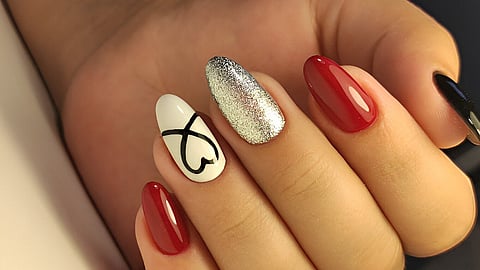

Brittle nails are a common concern today. Dr Mukta Sachdev has some advice
Everyone is concerned about the health and appearance of nails. Nails, though small, play a significant role in protecting the fingertips and enhancing your dexterity. However, like any part of the body, nails require proper care to stay healthy. Nail care and hygiene practises are essential.
Maintaining clean and well-groomed nails is the cornerstone of nail care. Regular cleaning prevents the build-up of dirt, bacteria and fungi, which can lead to infections.
Keep them clean and dry: Moisture creates a breeding ground for bacteria and fungi. After washing your hands or bathing, dry your nails thoroughly, especially the areas around the cuticles and under the nails.
Trim regularly: Trim your nails straight across with a clean, sharp nail clipper, and then round the tips in a gentle curve. This prevents hangnails and helps avoid trauma to the nail bed. For toenails, it’s especially important to trim them straight to prevent ingrown nails.
Moisturise: Just as your skin needs moisture, so do your nails. Apply a hand cream or oil regularly, paying special attention to the cuticles. Products containing ingredients like Vitamin E or Jojoba oil are particularly beneficial.
Avoid biting: Biting nails not only damages their structure but also exposes them to bacteria and viruses from your mouth, increasing the risk of infections.
Wear gloves: If you’re doing household chores that involve water, chemicals or harsh substances, always wear protective gloves. This helps protect your nails from becoming brittle and damaged.
Brittle nails are a common complaint. They may split, peel or break easily, often due to lack of moisture or underlying health issues.
Some causes of brittle nails:
Frequent wetting and drying: Repeated exposure to water, especially with harsh soaps or detergents, can strip the nails of their natural oils, leading to brittleness.
Nutrition deficiencies: A diet lacking in essential vitamins and minerals such as biotin, iron and zinc results in weak, brittle nails.
Medical conditions: Hypothyroidism, anaemia and Raynaud’s disease can affect nail health. If you notice persistent brittleness, it’s important to consult your dermatologist for a thorough evaluation.
Here’s how you can prevent brittle nails:
Moisturise regularly: Use a thick hand cream or cuticle oil daily. Moisturisers with urea, phospholipids or lactic acid are particularly effective in maintaining nail hydration.
Limit water exposure: Reduce the time your nails spend in water. Consider applying a protective nail hardener which can help reinforce the nail structure.
Improve diet: Ensure your diet is rich in biotin - found in foods like eggs, nuts and seeds, as well as iron and zinc from lean meats and leafy greens.
Gentle care: Be gentle with your nails - avoid using them as a tool to open cans or scrape surfaces. Use acetone-free nail polish removers as acetone can further dry out nails.
Hygiene is crucial
If you rely on regular manicure and pedicure for healthy-looking nails, keep these few things in mind. Stick to salons that ensure high standards of hygiene. Go to trained specialists. Don’t have your cuticles removed as they seal the skin to the nail plate, so removal can lead to nail infections. Also, make sure your nail technician sterilises all tools used during your procedure well to prevent infections.
When to seek professional help
If your nails remain brittle despite following these tips, or if you notice other changes like discolouration, thickening or separation from the nail bed, it’s time to see a dermatologist. These could be signs of a more serious condition such as a fungal infection or psoriasis. Proper nail care and hygiene are essential not just for aesthetics, but for overall nail health.
(The author is a consultant dermatologist)